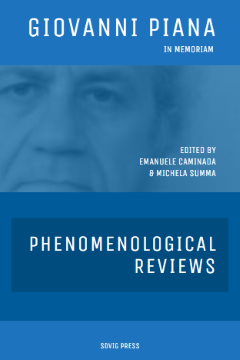Journal | Volume
Giovanni Piana
Special issue 1
Abstract
Giovanni Piana (1940-2019) leaves us an important body of work in the fields of phenomenology, aesthetics, and philosophy of music. Piana’s work is characterized by his ‘structuralist’ understanding of phenomenology. Such an understanding is not meant as an integration of the phenomenological method with the structuralist method developed in semiotics and applied to such different disciplines as anthropology or the theory of literature. Designating his philosophical approach as ‘structuralist phenomenology’, Piana rather intends to emphasize that phenomenology is primarily a method aiming to elucidate the structures of experience, i.e. its intrinsic order, lawfulness, and organization. Importantly, Piana takes ‘structure’ as the appropriate translation of the German ‘Wesen’. In such a way, he emphasizes that ‘structure’ is what qualifies the specific kinds of experiences according to their intrinsic features and according to the way in which they relate to their objects. Such an understanding of ‘structuralist phenomenology’ is presupposed by Piana’s philosophical project of a ‘theory of experience’, which should ground all further philosophical projects, included the theory of knowledge. Such an emphasis on the primacy of experience not only characterizes Piana’s critique to subjectivism, idealism, and constructivism. It also underlies Piana’s departing from the – for a long time dominant – overemphasizing of the ethical pathos implied in Husserl’s later discussion of the life-world. On Piana’s interpretation, recognizing the primacy of experience as embedded in the life-world should not be conceived in struct opposition to the the philosophy of science, nor should its aims be conflated with those endorsed by the philosophy of life. The return to the life-world should instead accomplish a program that is proper to phenomenology from its very beginning: retracing the sources of meaningfulness and knowledge within the self-structuration of experience and reassessing the processes and configurations that lead from simpler to more complex forms of structuration (see Piana, in this volume). This Special Issue of Phenomenological Reviews is dedicated to Piana and his work. It is not only conceived with the aim of honoring Piana’s memory. It also and particularly aims to begin the process of taking act of his intellectual legacy, to highlight the fruitfulness of his understanding of phenomenology, and to make crucial aspects of his philosophical work – available mostly in Italian – accessible to a larger international public.
Details | Table of Contents
the epistemic virtues of phenomenology as method
pp.7-16
https://doi.org/10.19079/PR.s1.1pp.49-68
https://doi.org/10.19079/PR.s1.5Zur Verteidigung und Weiterführung von Pianas objektivistischer Auffassung der Phänomenologie
pp.69-95
https://doi.org/10.19079/PR.s1.6phenomenology and "metaphysics" in Giovanni Piana's philosophy of imagination
pp.97-111
https://doi.org/10.19079/PR.s1.7a proposal based on Giovanni Piana's phenomenological structuralism
pp.113-128
https://doi.org/10.19079/PR.s1.8an application of Giovanni Piana's phenomenological structuralism
pp.129-160
https://doi.org/10.19079/PR.s1.9pp.161-183
https://doi.org/10.19079/PR.s1.10Giovanni Piana in memoriam
pp.185-203
https://doi.org/10.19079/PR.s1.11pp.205-237
https://doi.org/10.19079/PR.s1.12Dalla parte di Giovanni Piana
pp.257-268
https://doi.org/10.19079/PR.s1.14Matter, timbre and corporeality in Giovanni Piana's phenomenology of music
pp.269-284
https://doi.org/10.19079/PR.s1.15Conversations on "The Crisis of European Sciences", by Giovanni Piana
pp.305-316
https://doi.org/10.19079/PR.s1.18Publication details
Journal: Phenomenological Reviews
Volume: Special issue 1
Year: 2020
DOI: 10.19079/PR.s1
ISBN (paperback): 9782940738120
Full citation:
Caminada Emanuele, Summa Michela (2020) Giovanni Piana. Phenomenological Reviews Special Issue 1.


